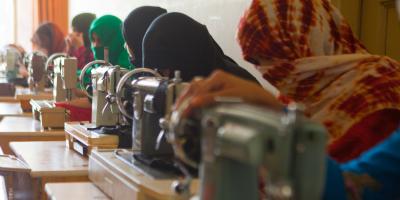
After breakfast every day Shabnum* sews chappan, a traditional coat worn by men and women in Afghanistan. In the afternoon, she embellishes the chappans with intricate needlework patterns to sell to interested buyers in Kabul. Tailoring and embroidery are not only a way of life for Shabnum, it is the core component of the business she started as a result of the classes she takes at a women’s protection center (WPC) and income-generation training supported by IDLO.
A survivor of domestic violence, Shabnum has been living in a shelter since 2016 after her case was referred by the Afghanistan Independent Human Rights Commission. Due to the abuses she suffered, Shabnum experienced intense effects of trauma and required a safe shelter and related services. Once taken in by the shelter operated by one of IDLO’s local Afghan partners, Shabnum was given a long-term refuge from the perils of her situation.
As part of its Supporting Access to Justice in Afghanistan program, IDLO works to improve the capacity of WPCs to deliver better services to women survivors of domestic violence in Afghanistan. Since 2012, IDLO has offered programming support to two local NGOs that operate a number of shelter facilities throughout Afghanistan, and provided training courses to six others.
The centers are comprehensive in their approach; they not only offer a safe haven for women who have suffered abuse, but also provide a range of services including psychosocial counselling, legal support and vocational training to facilitate their successful reintegration into society.
Shabnum had no education when she first arrived at the shelter. Sensing her interest in sewing, the shelter engaged Shabnum in vocational training to refresh her tailoring skills. Once reaching a level of proficiency, Shabnum was nominated for a scholarship to travel to India for 45 days where she learned how to fashion handbags, furniture covers, shirts, bedsheets and pillow covers.
After some time had passed, the shelter reached out to Shabnum’s family in an effort to reintegrate her, but her family refused to take her in. Shabnum moved to a halfway house this year where she enrolled in income-generation training supported by IDLO. There, Shabnum found an opportunity to apply her skills and set up a small business for herself.
Shelter employees assist her by marketing her products to colleagues in other provinces and by displaying them for sale in exhibitions. Based on demand and the need for raw materials, they also accompany Shabnum to the market where she buys fabric and threads from the profit she gains out of selling her crafts. Shabnum says that she manages to save some money after paying wages to her colleagues and stocking up for more orders.
Shabnum’s story is just one example illustrating the power of the equipping women survivors of violence to reclaim their lives through income-generation training. Beyond being provided a place of refuge, women with vocational training are enabled to feel a sense of pride in their work and can shape their own pathway toward independence and self-sufficiency. For women previously trapped in their situations, this can instill a sense of hope for the future and empowerment to claim it.
The head of the shelter describes the inspiring transformation seen in Shabnum: “If we compare her to the one who first came to the halfway house, she is a completely different person now.”
Now an emerging entrepreneur, Shabnum has expanded her business by training two other residents of the halfway house in the same trade and has hired them to help her meet the growing demand for her products, rendering a sustainability and multiplier effect to the program.
As she continues to adorn chappans with elaborate threading in a variety of colors and patterns, Shabnum dreams big. She says that she aspires to establish a small- and medium-enterprise in tailoring and embroidery, involving more women so that she can in turn contribute to other journeys to empowerment.
*not her real name.
IDLO’s Supporting Access to Justice in Afghanistan program is funded by the United States Department of State.

